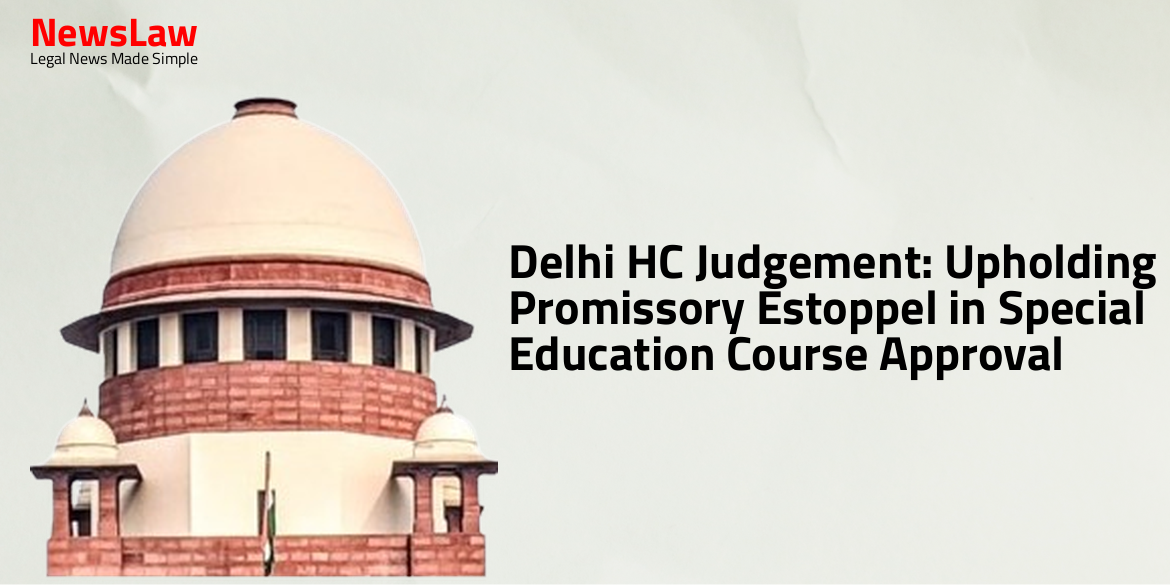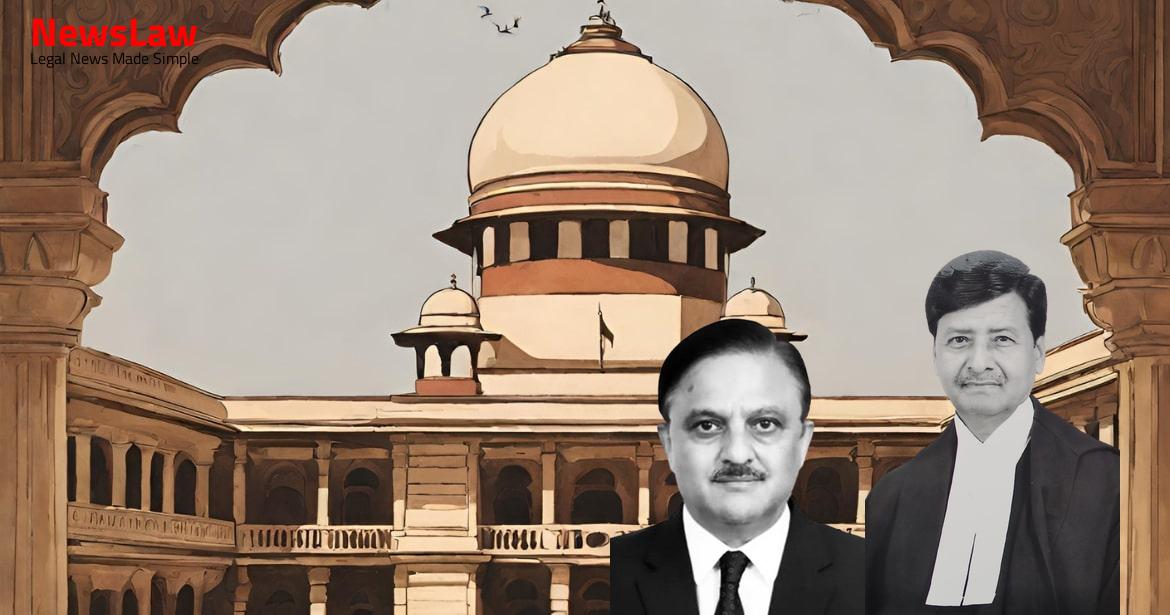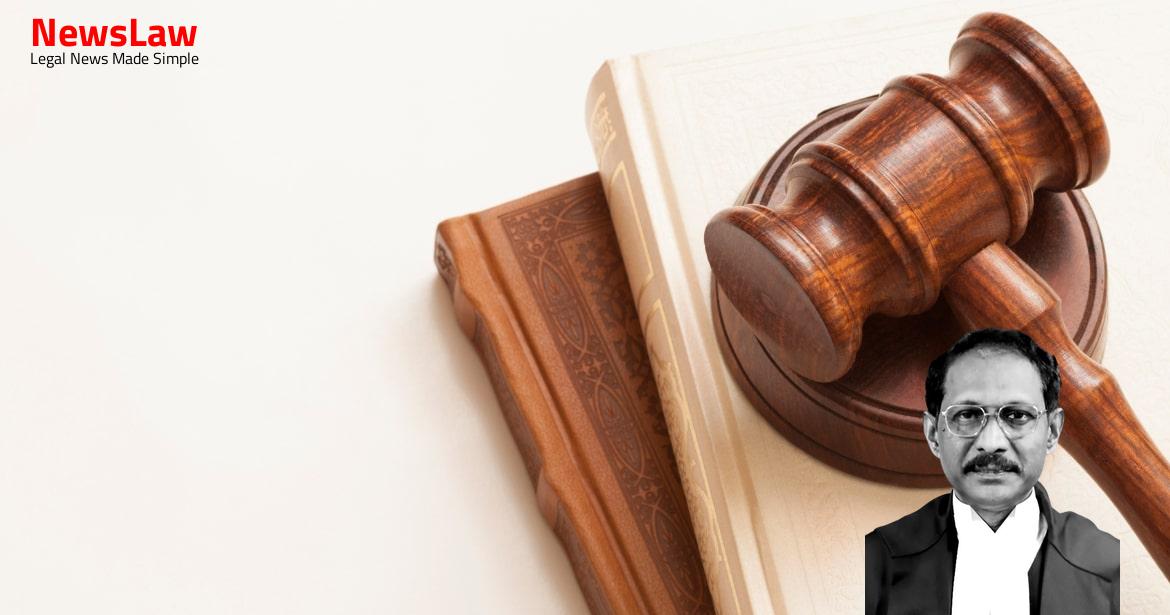The Delhi High Court recently issued a significant judgement regarding the approval of Special Education courses, emphasizing the principle of Promissory Estoppel. The petitioners, institutions providing Special Education courses, had their applications for new courses returned without consideration by the Rehabilitation Council of India (RCI). The Court found the RCI’s decision to be arbitrary and not in line with the law. Stay tuned to learn more about the legal intricacies of this case.
Facts
- The petitioners, who are institutions providing Special Education courses, applied for new courses on the basis of invitations from the RCI.
- Their applications were returned without consideration by the RCI, causing the petitioners to file writ petitions seeking relief.
- The RCI issued circulars on 4 January 2024 and 8 March 2024, which are challenged in the writ petitions.
- The petitioners contend that their infrastructure meets RCI norms and standards, therefore their applications should not have been returned.
- The RCI has been inconsistent in its decisions, allowing both new courses and increased intake in existing institutions.
- Regulation 24 of the RCI Regulations mandates institutes to adhere to the standards recommended by the RCI for Special Education courses.
- The Court needs to determine if the respondents followed the law in rejecting the petitioners’ applications
- The decision to allow an increase in seat intake for special educators in existing institutions is also under consideration
- Legal scrutiny is required to ensure the actions of the respondents were justified
Arguments
- Mr. Sharawat argues that the decisions to return the petitioners’ applications for starting new Special Education courses were solely based on a communication received from the office of the Hon’ble Minister of Social Justice and Empowerment.
- He contends that this communication has no legal basis and infringes upon the RCI Act, which does not allow for such interference by the Central Government.
- Mr. Sharawat highlights that the Central Government’s power under the RCI Act is limited to framing rules and not making executive decisions in the approval of institutions for Special Education courses.
- He asserts that the decision to return applications was not a result of independent deliberation by the RCI but was influenced by the Hon’ble Minister’s directive.
- Furthermore, Mr. Sharawat argues that the decision lacked justification and was arbitrary, especially considering the urgent need for Special Educators as recognized in the NEP 2020.
- He also challenges the hurried nature of the decisions and the lack of clarity on infrastructural requirements for institutions increasing seat intake beyond the prescribed limit.
- Additionally, Mr. Sharawat questions the compliance with principles of natural justice in returning the applications and emphasizes the need for proper application of mind in executive decisions.
- He concludes that the impugned decisions are unsustainable in law and should be set aside.
- 571 institutions incurred costs to set up infrastructure for special education courses as per requirements
- Institutions placed in jeopardy due to respondents’ actions
- Central Government cannot interfere in executive discretion when legislation is already in place
Analysis
- Promissory estoppel principle applied in the case.
- The decision to return the petitioners’ applications found to be unsustainable in law.
- Circulars invited fresh proposals for RCI approved training programs for the academic session 2024-2025.
- The decision to discontinue Diploma Level courses was later overturned due to demand.
- The decision to return applications based on a letter dated 27 December 2023 was not justified.
- Guidelines and norms were issued for institutions seeking to conduct Special Education courses.
- The status quo ante restoration was not possible for the petitioners.
- The impugned decisions created irreversible positions for the petitioners.
- Challenge to decisions not based on supervening public equity.
- The need for confirmation from the State Government for fresh proposals.
- Institutions invested resources based on the representations by RCI.
- Diploma Level courses continued due to demand as per decisions in EC meetings.
- Petitioners adhered to guidelines for submission of proposals.
- Supervening public equity not evident to justify decision reversal.
- The decision not to consider fresh proposals lacked statutory justification.
- Parallel drawn to NEP 2020 was not convincing.
- No Institute of rehabilitation professional course can be started without prior approval from the Council/Central Government.
- Institutions must approach the Council through the respective State Government/Union Territory Administration for approval of Degree/Diploma/certificate courses.
- State Government/Union Territory Administration must clearly indicate their stance on the establishment of institutions managed by Non-Governmental Organizations.
- In cases of urgent matters where circulation to Executive Committee members would defeat the purpose, the Chairperson has the power to act on behalf of the Council, subject to ratification by the Executive Committee in the next meeting.
- Regulations 7, 12, and 24 highlight various responsibilities and powers of the Council, Executive Committee, and norms for starting Rehabilitation Professional Courses.
- Promissory estoppel can apply against the Government
- Government can change its stand if there is supervening public equity
- Court must ensure that public interest justifies Government’s change of stand
- Principle of promissory estoppel was upheld in Pt. Prasadi Lal Kakaji Teacher Training College v. N.C.T.E. case
- The urgent need for additional Special Educators has been expressly recognized
- Considerations of public interest do not justify the return of the petitioners’ applications for new D.Ed. Spl. Ed. and B.Ed. Spl. Ed. courses
- The decision to return the petitioners’ applications cannot be justified by the NEP 2020
- The position in law is clear, and there is no need to consider other issues or cited decisions
Decision
- The decision to grant approval for seat enhancement will be based on verification of requirements.
- The Council will conduct inspections before the enhancement of seats.
- The Circulars dated 4 January 2024 and 8 March 2024, returning the petitioners’ proposals, are quashed and set aside partially.
- The proposals will be processed in accordance with the law.
- The challenge to the Circular dated 8 March 2024, allowing existing institutions to increase seats, is dismissed.
- The writ petitions are partly allowed with no orders as to costs.
Case Title: SHANTI NIKETAN COLLEGE OF SPECIAL EDUCATION & ANR. Vs. REHABILITATION COUNCIL OF INDIA (2024:DHC:4642)
Case Number: W.P.(C)-5679/2024



